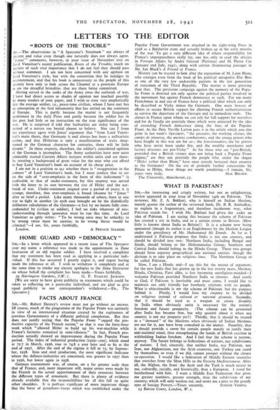LETTERS TO THE EDITOR " ROOTS OF THE TROUBLE" Stn,—The
observations in " A Spectator's Notebook " are always of interest and value even though one naturally does not always agree. Janus"' comments, however, in your issue of November 2ISt on Lord Vansittart's recent publication, Roots of the Trouble, touch on matters of such vital importance that I .do not feel they should pass without comment. I am not here concerned with any opinion on Lord Vansittart's style, but with the contention that he indulges in overstatement, and that his book is unnecessary as the people of this country have only to look across the Channel at a prostrate Europe to see the dreadful brutalities that are there being committed.
Having served in the ranks of the Army since the outbreak of war, I have had direct access to shades of opinion not touched possibly by many readers of your paper, and I wish to state very emphatically that the average soldier, i.e., peace-time civilian, whom I have met has no conception of the foul inhumanity that has settled on the continent of Europe. This is partly because the matter is not frequently mentioned in the daily Press and partly because the soldier has in the past had little or no instruction on the true significance of the war. He is surprised if told that barbarities are today being com- mitted of a nature too bestial almost to believe. Nor can I from my experience agree with Janus' argument that " from Lord Vansit- tart's main thesis, that Germany is and always has been a militaristic nation, and that Hitlerism is only a manifestation of traits deep- rooted in the German character for centuries, there will be little dissent." In these respects, therefore, the soldier's considered opinion of the German is incomplete. The Army authorities have now most admirably started Current Affairs lectures within units and are there- by creating a background of great value for the man who can afford to buy Lord Vansittart's book on account of its cheap price.
I am not in a position to say whether there is " exaggeration in the content " of Lord Vansittart's book, but I must confess that to err on the side of " over-emphasis in the form of this indictment " is preferable to that of under-statement, for this country was served with the latter to its cost between the rise of Hitler and the out- break of war. Under-statement reigned over a period of years; it is strange, therefore, that over-emphasis is found irksome by " Janus " after so brief a period. Like many thousands of others, born in one war to fight in another (in each case brought on by the diabolically deliberate calculations of the Germans—a fact by no means fully com- prehended by civilian or soldier), I feel no risks whatever of mis- understanding through ignorance must be run this time. As Lord Vansittart so aptly writes : " To be wrong once may be unlucky; to be wrong twice must be unwise; to be wrong thrice would be criminal."—I am, Sir, yours faithfully, London. A PRIVATE SOLDIER.
•


























 Previous page
Previous page